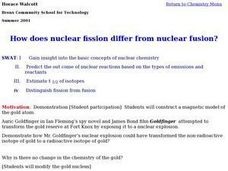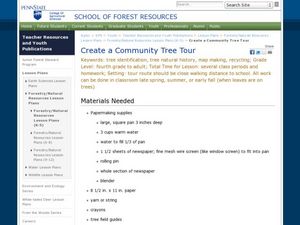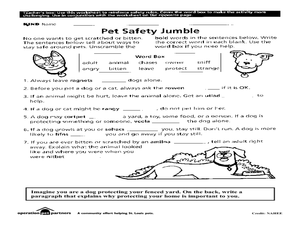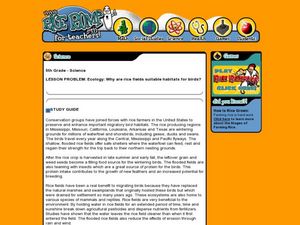Curated OER
Autoimmune Disease
Students conduct Internet research on an autoimmune disease, and present the information in a PowerPoint presentation.
Curated OER
How does Nuclear Fission differ from Nuclear Fusion?
Students examine concepts of nuclear chemistry. They compare and contrast the topics of nuclear fission and nuclear fision. They predict the outcome of reactions based on the types of emissions and reactants.
Curated OER
Dirt Babies
What exactly is a dirt baby, you might ask. Look over the plan to find out! All of the materials and procedures necessary for creating a dirt baby, such as grass seeds, dirt, and nylon stockings, are listed, along with ideas for...
Curated OER
Berenstain Bears: Grow It
Second graders read several books and complete an activity that coincides with each book. i.e. They read 'Berenstain Bears: Grow It' by Stan and Jan Berenstain and then decorate a flower pot, plant flower seeds in it and record their...
Curated OER
Was Kepler Correct?
Students investigate the elliptical orbit around the Sun. They use the information gathered to measure the distance to the Sun from the closest orbital point and the farthest orbital point.
Curated OER
Red Mangroves Of Southern Florida
Learners engage in a unit plan to examine the ecological background for the Mangroves of southern Florida. They conduct research using print and computer technology sources. They use the information in a number of other extension...
Curated OER
Project 1
Students are given a coin to observe and make inferences about. Using a worksheet, they make two columns to list their observations and inferences in an organized manner. They develop a hypothesis based on one of the inferences and...
Curated OER
Seasons
Students explore the four seasons. Through observation activities, they explore and discuss the weather changes that occur during each season. Students create a graph of the clothing that is worn during each season.
Curated OER
Non-Point Source Pollution
Students study non-point source pollution. They research the concept of bio-degradation and/or Nutrients/Fertilizers and discuss how non-point source pollution impacts the environment. Afterwards, they participate in an interactive...
Curated OER
Classifying Dog Breeds
Young scholars classify dog breeds. In this animal science lesson, students research various breeds of dogs on the Internet and classify breeds into small, medium, and large breeds. Young scholars illustrate their classification notes...
Curated OER
Create a Community Tree Tour
Students study tree identification. In this tree identification lesson, students design and assemble a tree tour booklet describing 5 trees found in their community. The booklet should feature common and Latin names of the species, a...
Curated OER
What's a Tree Worth?
High schoolers calculate the board footage of a tree. In this forestry lesson plan, students use a Biltmore tree scale stick to calculate the number of board feet that would be produced. They quantify the economic value of a tree from...
Curated OER
Graphing Sunspot Cycles
Students explore sunspots and then graph them to analyze the data. In this sunspot cycles lesson students complete an activity sheet and complete questions.
Curated OER
Plotting Sunspot Activity
Students explore how to graph sunspots using a solar graph. In this sunspots lesson students investigate sunspots and complete and evaluation worksheet.
Curated OER
Tracking an Active Sunspot Region
Eighth graders plot the location of a single active region for 12 days. In this sunspot lesson students track an active region across the face of the sun.
Curated OER
Are You an Animal Safety Sleuth
In this animal safety lesson, students brain-storm ways to be kind and safe with animals throughout the year. Students create a Kind Calendar for Animals in art class and distribute copies to other classes in the school. grocery...
Curated OER
What are rice farmers doing to help the environment with their water-filled rice fields?
Third graders research rice fields. In this rice fields lesson, 3rd graders discuss how fields contribute to the environment by providing an important food source for birds. They find the benefits of rice fields to water and soil as...
Curated OER
Ecology: Why Are Rice Fields Suitable Habitats for Birds?
Fifth graders discover the uses for rice by reading about the habitats of certain birds. In this agriculture lesson, 5th graders research birds from the Gulf Coast and California and their reasons for living in rice fields....
Curated OER
Whose Brain is THAT?!
Young scholars explore various animal brains. In this animal anatomy lesson, students compare and contrast animal brains with the brain of a human. They record several characteristics in a data table for each brain they observe.
Curated OER
How much Carbon Dioxide is in My Seltzer Water?
Learners discover the law of conservation of mass though experimentation. In this chemistry lesson, students experiment with acid - base indicators to determine the presence of carbon dioxide. Learners complete the labs with...
Curated OER
How Powerful is Static Electricity
Students explore energy by participating in controlled electricity experiment. In this static electricity lesson, students identify the different sources that can create energy and how static electricity can be created very easily on...
Curated OER
Where's the Grass
Students participate in a grassland game. For this grassland lesson, students simulate the impact of grazing animals and invasive weeds on grasslands.
Curated OER
Breaking it Down
Students discover how water expands when frozen during a glacier. In this matter instructional activity, students fill a glass jar with water, leaving no room for air in the jar and place it in the freezer. Students retrieve the...
Curated OER
Ancient Sun Models of the World
Middle schoolers explain that many different cultures across the world developed their own reasoning for the weather around them. They explore the different cultural beliefs of the sun's cycle and to create their own story of the sun's...

























